Hitchcock/Truffaut Blu-ray Movie
HomeHitchcock/Truffaut Blu-ray Movie 
Universal Studios | 2015 | 80 min | Rated PG-13 | Dec 20, 2016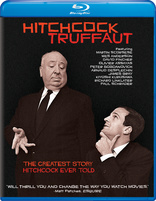
Movie rating
7.2 | / 10 |
Blu-ray rating
| Users | 0.0 | |
| Reviewer | 4.5 | |
| Overall | 4.5 |
Overview
Hitchcock/Truffaut (2015)
In 1962 Hitchcock and Truffaut locked themselves away in Hollywood for a week to excavate the secrets behind the mise-en-scène in cinema. Based on the original recordings of this meeting - used to produce the mythical book Hitchcock/Truffaut - this film illustrates the greatest cinema lesson of all time and plummets us into the world of the creator of Psycho, The Birds, and Vertigo. Hitchcock’s incredibly modern art is elucidated and explained by today’s leading filmmakers: Martin Scorsese, David Fincher, Arnaud Desplechin, Kiyoshi Kurosawa, Wes Anderson, James Gray, Olivier Assayas, Richard Linklater, Peter Bogdanovich and Paul Schrader.
Starring: Wes Anderson, Olivier Assayas, Peter Bogdanovich, Arnaud Desplechin, David FincherNarrator: Mathieu Amalric
Director: Kent Jones (VI)
| Documentary | 100% |
Specifications
Video
Video codec: MPEG-4 AVC
Video resolution: 1080p
Aspect ratio: 1.78:1
Original aspect ratio: 1.78:1
Audio
English: DTS-HD Master Audio 5.1
Subtitles
English SDH, French, Spanish
Discs
Blu-ray Disc
Single disc (1 BD)
Playback
Region A, B (C untested)
Review
Rating summary
| Movie | 4.5 | |
| Video | 4.0 | |
| Audio | 4.0 | |
| Extras | 2.5 | |
| Overall | 4.5 |
Hitchcock/Truffaut Blu-ray Movie Review
Reviewed by Jeffrey Kauffman January 12, 2017On the face of things, there would appear to be two no more strange cinematic bedfellows than Alfred Hitchcock and François Truffaut: Hitchcock, a “structuralist” who famously storyboarded some of his most iconic sequences almost to the point of knowing how many frames of film each shot would take, and Truffaut, the one time critic (uh-oh) who became one of the leading lights of Nouvelle Vague, deconstructing just about every honored film trope in the process. And yet when Truffaut was asked to name his favorite director back in the nascent days of his own directing career, he almost invariably mentioned Hitchcock. Considering how iconic Truffaut is now, it’s perhaps difficult to remember that back in the early to mid-sixties, at least in his guise as a director of feature films, Truffaut had a relatively meager quartet to his name. By 1962, when Truffaut interviewed Hitchcock, Truffaut had directed three undeniable masterpiecies, The 400 Blows, Shoot the Piano Player, and Jules and Jim. By the time the book form of Hitchcock/Truffaut finally appeared in 1966, he had also directed the at least somewhat less universally admired The Soft Skin. Truffaut of course had also collaborated on other New Wave masterpieces during this period, including Breathless, but lining these men up side by side as directors, especially in the context of Truffaut’s own auteur theory and in the setting of a 1962 time frame, might help to elucidate just how unequal Truffaut himself probably felt when interviewing Hitchcock in a series of conversations that became source material for one of the most influential books in the history of film literature.
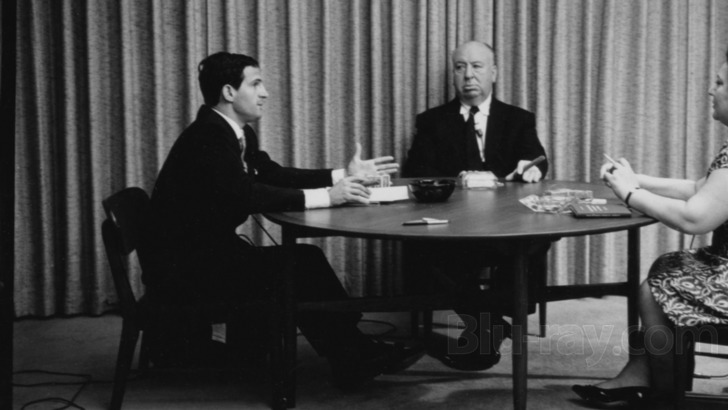
A film about a book which in itself was a more or less transcription of a set of spoken interviews might seem to be too removed from any visceral subject matter to ever really resonate, but nothing could be further from the truth with regard to Hitchcock/Truffaut. While the documentary has some interesting, albeit relatively brief, background on the history between these two titans, some of the most exciting content is presented in actual audio snippets from the interviews which play out to relevant film clips.
There’s one amazing moment relatively early in Hitchcock/Truffaut which may provide a suitable example for the difference in their experience levels and temperaments. The two are discussing some interlinked phenomena like presentational aspects and editing, and they start talking about a great little vignette in The 400 Blows where little Antoine, playing hooky as he so often does, catches an indiscreet glimpse of his mother on a busy urban street. Hitchcock, who evidently hadn’t seen the film by the point of the interview, asks Truffaut about how he handled the moment and makes the astounding statement that he hoped Truffaut didn’t use any dialogue (which in fact Truffaut had, as the film clip accompanying the conversation shows). It’s incredible “little” moments like these that give this documentary an almost palpable sense of excitement at times. (And as heretical as it may sound, my personal response after hearing this interchange is that Hitchcock was absolutely right, the scene probably would have had more impact with no dialogue attached.)
It’s the interchanges between Truffaut and Hitchcock that will probably therefore provide the most interest to ardent cineastes, though everyone will no doubt find some nuggets of insight from a coterie of talking heads, including everyone from Martin Scorsese to Wes Anderson to Richard Linklater. There are some surprisingly frank assessments of Truffaut’s stylistic proclivities in comparison to those of Hitchcock, some of which may or may not rankle certain fans. The documentary may also surprise some younger newcomers to Hitchcock's work in its revelation that in the early sixties, despite the overwhelming success of films like Psycho and The Birds, Hitchcock was seen as (to quote Peter Bogdanovich) "an entertainer" rather than artist. It was in fact young guns like Truffaut and Bogdanovich who helped the reassessment of Hitchcock's contributions to really take hold in the sixties.
One of the interesting sidebars that comes up at various points is how much the book form of Hitchcock/Truffaut affected so many legendary filmmakers in their relative youth. It’s an actually kind of affecting shared memory several legends have and speaks to how sensational the book was for film lovers when it first appeared. Some of the book’s conceits, like its near frame by frame breakdown of an iconic scene in Sabotage are revisited here with appropriate snippets from various films, but as instructive as the many examples in Hitchcock/Truffaut undoubtedly are, it’s the conversation between these two masters that will really up the ante for many devoted cineastes.
Hitchcock/Truffaut Blu-ray Movie, Video Quality 
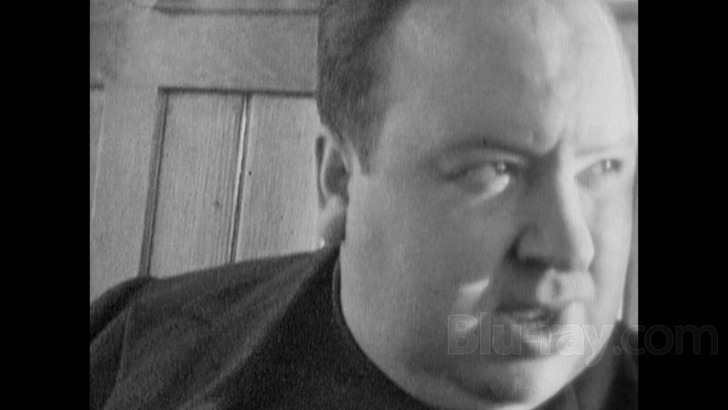
Note: My ISP is unfortunately not even offering dial up upload speeds, perhaps due to the record snowfall we've just experienced in Portland (at
least that's one of many excuses they're giving me). It took several hours to even get the five screenshots this review currently offers uploaded. I'll
revisit this in the next day or two when things have hopefully improved and provide more screenshots at that time.
Hitchcock/Truffaut is presented on Blu-ray courtesy of Universal Studios with an AVC encoded 1080p transfer in a variety of aspect ratios (as
befits the many films it features clips from), but with contemporary segments in 1.78:1. The talking head segments all look decently sharp and well
detailed, even if the palette is often a bit bland, while the archival footage is understandably more varied in appearance. Things like old home movies look
pretty ragged and don't offer much in the way of detail, while some of the archival film footage from the filmographies of both of these famous directors
looks decent, even if I have a hunch not all of it was sourced off of the most recent restorations/scans available. There are occasional quasi-combing
effects in brief moments like the camera panning over the letters that Truffaut and Hitchcock shared as they planned the interview meetings.
Hitchcock/Truffaut Blu-ray Movie, Audio Quality 
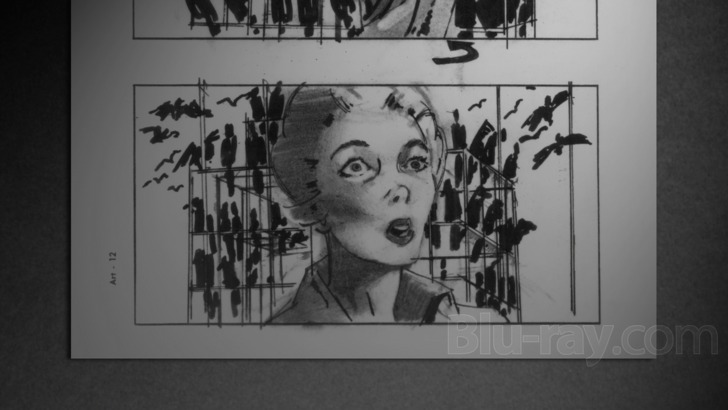
Hitchcock/Truffaut's DTS-HD Master Audio 5.1 track may strike some as a bit of needless overkill, since there's frankly not a whale of a lot of surround activity at play, even in films that have had at some point in their release history been afforded surround tracks. Most of this piece is either talking heads, voiceover, or snippets from the foundational interviews between Hitchcock and Truffaut, and as such there's simply not much immersion to exploit. With an understanding that audio has, like the video, been cobbled together from varying sources, fidelity is fine and there are no real issues other than a few age related crackles and hiss in some of the archival audio.
Hitchcock/Truffaut Blu-ray Movie, Special Features and Extras 
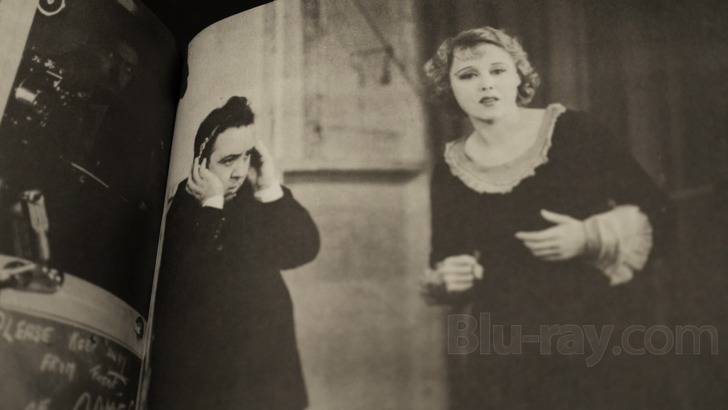
- Q & A with Kent Jones and Noah Baumbach (1080p; 23:51) is an interesting and far ranging conversation, though it could have used a different director (auteur?) -- the framings are a little wonky at times.
- An Appreciation of Notorious (1080p; 6:16) is an interesting analysis of certain plot points, including the tawdriness of Ingrid Bergman's character as well as how it's weirdly the Claude Rains character who ends up evoking the most sympathy.
- Peter Bogdanovich Remembers Hitchcock (1080p; 6:37) is a sweet reminiscence by the ascot wearing director, which includes Bogdanovich's memories of spearheading the first retrospective of Hitchcock's work in the early sixties.
- Richard Linklater on Truffaut (1080p; 3:52) is perhaps a little less insightful than Bogdanovich's take on Hitchcock, but offers some okay sentiments.
- Rope: Pro and Con (1080p; 5:01) offers dueling talking heads debating the pluses and minuses of one of Hitchcock's most controversial films.
Hitchcock/Truffaut Blu-ray Movie, Overall Score and Recommendation 
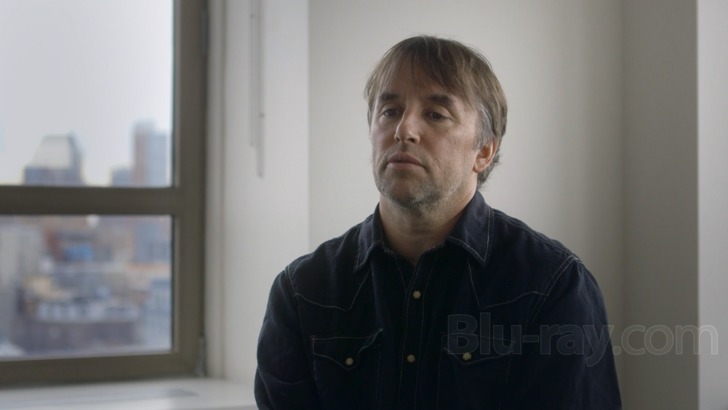
I can't imagine any even passing fan of Hitchcock and/or Truffaut not being entranced by this excellent documentary. The talking head analyses are generally very thoughtful, the selection of film clips often quite educational, and the actual snippets of the interviews between Hitchcock and Truffaut incredibly illuminating. Technical merits are fine with an understanding that this is yet another documentary cobbled together from a variety of source elements, and Hitchcock/Truffaut comes Highly recommended.
Similar titles
Similar titles you might also like

Faces Places
Visages villages
2017

The Salt of the Earth
Le Sel de la Terre
2014

Always Shine
2016

Jodorowsky's Dune
2013

The Look of Silence
2014

Cameraperson
2016

The Last of the Unjust
Le dernier des injustes
2013

The Velvet Underground
2021

RBG
2018

King Cohen: The Wild World of Filmmaker Larry Cohen
2017

We Are X
2016

David Lynch: The Art Life
2016

On the Bowery
1956

Sympathy for the Devil
One Plus One / The Rolling Stones
1968

Never-Ending Man: Hayao Miyazaki
終わらない人 宮﨑駿 / Owaranai Hito Miyazaki Hayao
2016

Ingrid Bergman: In Her Own Words
Jag är Ingrid
2015

Life Itself
2014

De Palma
2015

Won't You Be My Neighbor?
2018

Lost Soul: The Doomed Journey of Richard Stanley's Island of Dr. Moreau
House of Pain Edition
2014